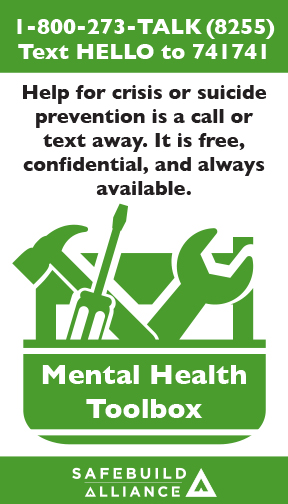The Facts:
The Construction industry rates as the second highest rate of suicide in the United States. At a rate of 53.3 per 100,000 workers according to the CDC.
In the U.S. there are approximately 123 suicides per day. That breaks down to 1 death every 12 minutes.
What makes construction workers vulnerable?
- We work in roles that are isolating
- Employment is dependent on economy
- Spending large amounts of time away from family and friends
- Chronic pain caused by manual labor
- Stress due to time constraints, work environment and poor sleep.
- Prevalence of alcohol and substance abuse
- Stigma of mental illness
These are but a few factors. We want to provide you with a way to address these issues and to recognize the signs and symptoms. Once recognized, you can facilitate the proper help to ensure we all go home to our friends and family each day.
You don’t have to be a mental health worker to help someone who is struggling
WARNING SIGNS
- Talking about suicide
- Self-loathing, self-hatred
- Withdrawing from others
- Self-destructive
- Hopeless
- Decreased productivity
- Talking about being a burden
- Extreme mood swings
- Increased tardiness
- Absenteeism
PREVENTION TIPS
- Don’t ignore it – speak up if you’re worried or see the signs
- Show your concern; if you’ve noticed someone acting differently, talk to them. Find out why they don’t seem like themselves
- Respond quickly if you feel a friend or coworker is in crisis
- Offer help and support
- Contact the suicide prevention hotline or crisis text line
RESOURCES
Suicide prevention & mental health presentation tools
- Spencer Thomas Guidebook to Training Programs
- Construction & Suicide Prevention Action Steps
- Suicide Prevention in the Workplace
- Dimoff_Fall-Symposium-Presentation-2017
- Gina Excellence in Mental Health Care
- L4L Presentation MH in the Workplace Conference
- Spangler Keynote
- Suicide Technical Package
Articles
Washington/Multnomah/Clackamas County information
- Tri County Area Community Resources
- Tri County Area Mental Health Resources
- Tri County Area Mental Health Training Resources
Grief Support
Additional resources from around the web:
https://www.gettrainedtohelp.com/
Free training opportunities: Question, Persuade, Refer (QPR), Adult Mental Health First Aide (AMHFA), Youth Mental Health First Aide (YMHFA), Counseling on Access to Lethal Means (CALM), Applied Suicide Intervention Skills Training (ASIST), Honest, Open, Proud (HOP).
A group of specially trained citizen volunteers who provide emotional aid and practical support and resources to victims of traumatic events and their families in the first few hours following a tragedy. TIP Volunteers are available 24 hours a day, 365 days a year. 24-hour contact number 503-940-7997.
Free, confidential referral and information service that connects people specialists who will help find local health and human services. Available 24 hours a day, seven days a week by dialing toll free 2-1-1 or visiting 211.org.
Sally Spencer-Thomas
https://www.sallyspencerthomas.com/
QPR Institute
Videos:
Video: Denver Fire Department Making Suicide Prevention Part of Total Wellness
Video: Dr. Paul Quinnet, 2017 Mates In Construction Mental Health Conference


